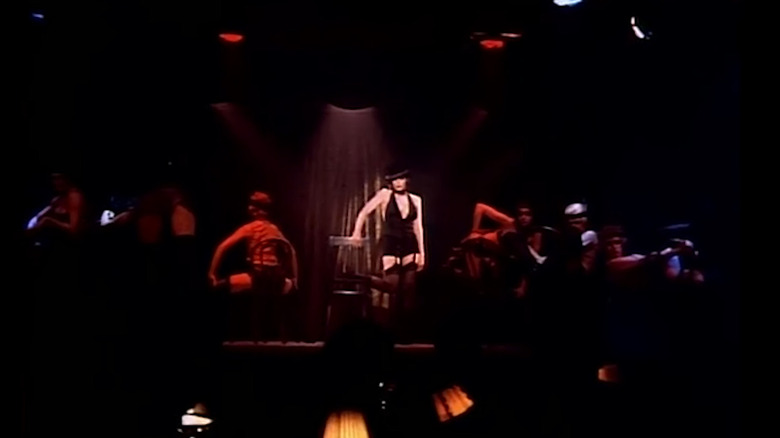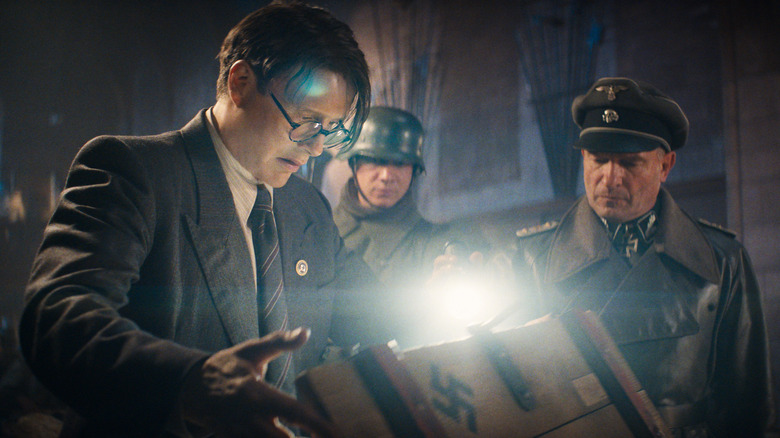Indiana Jones: The Dark Real-Life History Behind Mads Mikkelsen's Most Chilling Line In Dial Of Destiny
Contains spoilers for "Indiana Jones and the Dial of Destiny"
The Nazis of "Indiana Jones" are more terrifying — and punchable — than ever, thanks to cautious scripting and a few lines of chilling dialogue in the franchise's latest entry.
After "Raiders of the Lost Ark," director Steven Spielberg chose not to use history's most despicable fascists as the go-to antagonists for the 2008 film "Kingdom of the Crystal Skull." However, franchise newcomer — and potential reviver — James Mangold opted to bring them back once more for "Indiana Jones and the Dial of Destiny." This time around, the villains feel significantly more threatening, which is almost certainly a reflection of the disturbing rise in neo-Nazism across the globe.
Gone are the cartoonish, face-melting, coat-hanging villains of "Raiders of the Lost Ark," who would feel just as at home on the cover of a "Captain America" comic book. In their stead, Mangold presents us with a foe more tangible in Mads Mikkelsen's Jürgen Voller — a brilliant scientist as fluent in mythology as he is in propaganda and manipulation. The film even goes so far as to present Voller as an American asset, calling clear attention to Operation Paperclip — you know, that very real and damning U.S. Intelligence initiative that saw Nazi scientists brought to America to work on weaponry during the Cold War.
Suffice it to say, there is nothing light or satirical about the Nazis in "Dial of Destiny," a fact emphasized firmly yet subtly with a line of dialogue from Mikkelsen's Voller toward the end of the film. With his historically revisionist goals in his grasp, he taunts: "Yesterday belongs to us." This line seems to be a carefully chosen reference that solidifies Voller's vile motivations by alluding to an enduring and complicated 1960s song.
Mikkelsen's line appears to be a reference to the 1966 musical Cabaret
The phrase "Yesterday belongs to us" is eerily close to the title of the fictitious Nazi anthem "Tomorrow Belongs to Me," written by Jewish composers John Kander and Fred Ebb for their groundbreaking theatrical work "Cabaret."
Originally premiering in 1966 (just three years before the events of "Dial of Destiny"), "Cabaret" is a popular and staunchly anti-fascist musical that chronicles the insidious rise of the Nazi party in Germany from several different perspectives. The story primarily follows a politically ambivalent American writer who finds himself intimately entangled with his pushy English students, Jewish neighbors, and the staff of a queer nightclub in 1930s Berlin. "Cabaret" has often been described as intentionally deceptive, especially in its tone, first appearing as a raucously seductive dramedy only to naturally reveal itself as a devastating tragedy.
This deceptiveness is best encapsulated by the song "Tomorrow Belongs to Me," which is heard twice in the show's first act, usually in varied contexts. In most productions, it is initially sung by either a young boy or a waiter, its pastoral lyrics and dreamlike melody painting an innocent, optimistic image for the unassuming audience. It isn't till later that it becomes clear — usually through a creeping build of militaristic instruments, the sudden appearance of nationalist emblems on set, or a growing ensemble of singers eerily large in number — that the song is a fascist anthem meant to inspire a violent, nationalistic uprising.
Voller's apparent allusion to the song in "Dial of Destiny" also eerily mimics the way it has been misappropriated over the years.
Unfortunately, it makes sense that a Nazi like Jügen Voller would embrace the song
Troublingly, "Tomorrow Belongs to Me" was so effective as a fictional fascist anthem that it was soon adopted by real-life fascists across the world. One of the first organizations to use the song for malevolent purposes was the National Socialist League, an American neo-Nazi group composed entirely of gay men. However, the song's presence in "Dial of Destiny" surely goes beyond merely evolving the Nazis of "Raiders of the Lost Ark" from hapless soldiers into a more insidious contingent of white supremacists.
As we said earlier, there's a clear consciousness within the narrative of "Dial of Destiny" that Nazis are no longer a historical foe long since defeated, but an emerging and ever-growing threat. In the same vein, "Tomorrow Belongs to Me" is as relevant today as it was in the 1960s, with notable contemporary proponents of Nazi ideology such as Richard Spencer publicly appropriating the song within the last few years.
From its use of Nazis to its admittedly bizarre time-travel plot, "Dial of Destiny" is consistently concerned with how history impacts the future — a concern that lends itself quite well to an Indiana Jones adventure specifically. Its presumed allusion to "Tomorrow Belongs to Me" is just one of the many ways the film colors its historical antagonists with a welcome, yet chillingly, present urgency.


